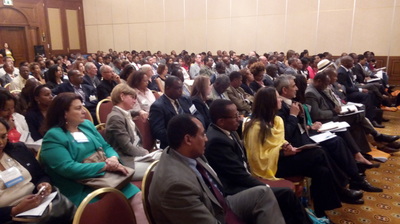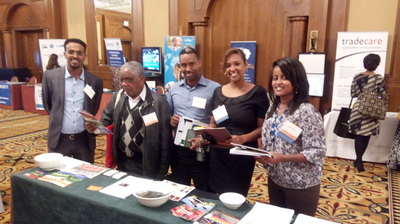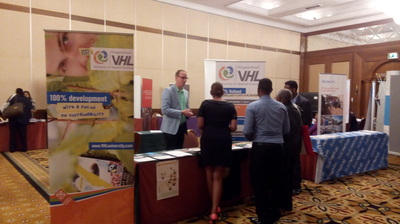|
On this blog I have once argued that development is not something you can manage or sell. It just happens despite many efforts of people and organisations to exert control over it. Even the names of the courses I am attached to at VHL University suggest that development is something you can manage. Last Saturday I reached out to young people in the Netherlands considering studying at VHL University in Velp next year where we are offering the course International Development Management. At VHL we also offer a Professional Masters courses and last week I was at the DEVEX Career forum in Addis Ababa reaching out to prospective students 'selling' them our twice awarded Top Ranking Educational Courses. Next week once again the AidEx opens its doors during their annual event in Brussels, providing a market place to a number of agencies that make big business contributing to humanitarian aid. So development may not be something you can manage, but apparently it is something you can sell.
Development despite the market What does this imply? There is a market place for development. Simultaneously amongst donors at least, there is a great desire to be able to manage development. At least proper management of development projects is something that is a necessity, at least for accountability purposes. Nevertheless development still happens even if projects are managed poorly. For the last two years we had in average 70 international students joining us for a full year, only to learn that development happens despite efforts from many agencies to steer it to their advantage. I personally travel with students through the institutional development landscape engaging them with various discourses on aid and trade, public-private partnerships, civic driven change and you name it. It only goes to show that the world has become a global village and that there really is something like a global development market place. World Investment Forum This has also been recognized by those trying to manage Sustainable Development as it evolves towards the MDG deadline of 2015. Sustainable Development is hot. The global development industry is opening its doors to investors to come in and join forces with governments and NGOs in public-private partnerships for sustainable development. This became particularly visible during the recent World Investment Forum organized by UNCTAD in Geneva. Several sessions were held with representatives of the public and private finance industry, some including some international non-governmental organizations. On the third day for example a round table with sovereign wealth funds was held. Sovereign Wealth Funds are state-owned investment funds investing in real and financial assets. Sovereign wealth funds invest globally. Most SWFs are funded by revenues from commodity exports or from foreign-exchange reserve held by central banks. Their total value according to UNCTAD is estimated at 6 trillion dollar. Together with the public pension funds of 18 trillion dollar representing a substantial financial resource base. Sustainability investment Putting up some investment standards for these amounts of funding can make a difference. The question is will states allow oversight over their most important fiscal tool despite the efforts of UNCTAD to draft an Investment Policy Framework for Sustainable Development in Doha in 2012. It is important to see both Norway and China (as two of the biggest sovereign wealth fund managers) present at this round table. With a special Issues Note UNCTAD tries to table the necessary reforms that should address some of the fundamental flaws of the system of International Investment Agreements. Will UNCTAD and others manage to persuade the investment business to divert its flows to impact development positively? At least sufficient countervailing power needs to be generated in societies to make governments manage public finance in such a way that it delivers for people and planet as well. Reinvent profit And here is where we come in again as educators in the development landscape. If current trends prevail our graduates will need to be fully equipped, not only to function as innovators in the rural space but even as advisors to international fund managers on where to spend their money and how to manage their risks. I am afraid we will need some additional cross-sector partnerships in order to master this new vocabulary and converse with the field of global finance to help reinvent the notion of profit. Our marketing at open days and exhibitions will hopefully bring us a new caseload of critical minds that are motivated to help us redefine management of development altogether.
4 Comments
3/11/2014 23:30:53
I entirely agree with your views. Our students will have to play in rural spaces with innovative ideas.unless they are exposed to ground realities for sufficiant length of time we can not expect innovative inputs which are relevant to ground realities.investment with professional NGO by Govt/industry as partner in development is necessary to rationalise the thought process on both sides.i feel development can occure otherwise also is valid but can reach early and be guided with intervention.
Reply
Assegid
6/11/2014 00:58:27
Valid point, Reinier! Linking classroom teaching with field reality is very crucial. We're living in an interesting era where the traditional "development" actors are increasingly challenged by the unusual/newcomers ... with a more robust, dynamic approach to development. The private sector begun to show keen interest in doing business with social returns in mind. And it's getting popular and gaining momentum in developing world. Investment fund will be prioritized more than aid fund; credit schemes will be preferred than charity money; soft skills will be accompanied by technical know-hows; ...in short more ACTIONS than PREACHING! Traditional donors will have to reconsider their mode of cooperation - moving towards a business partner! That is the shift in the making (as I see it...) and the learning space should emphasize on this new paradigm shift.
Reply
Gerry Finnegan
6/11/2014 03:27:14
Hello Rainer. This is a very fresh and quite a practical input into development discussion. As a long-time marketing professional and academic, and even longer development practitioner, I have not always (been able to) connected the two interests/disciplines. However, I find your piece most interesting. I would add that there should be a greater emphasis in development circles on marketing the links between business and development, e.g. through approaches such as creating shared value and bottom of the pyramid initiatives.
Reply
Assegid
7/11/2014 01:24:10
Just a thought....Is it always realistic to expect "shared values" in this increasingly divided world? What if the different parties just hold on to their world view (values) but with utmost respect for their diversity, and enter from that point into a collaborative partnership? I often hear "shared values" being mentioned as De approach; but in reality one will see "the agenda of the bigger will prevail ultimately..." Whoever brings in funds, succeed in imposing its values on the other. This leads me into the question of: How can the grassroots be helped to advocate for their interests? For their values to be respected & incorporated in crafting a "shared-value" if anything? thanks!
Reply
Your comment will be posted after it is approved.
Leave a Reply. |
About meMy name is Reinier van Hoffen. U®Reading
Click here for a summary.
Also find the text of a lecture Dr. Achterhuis held at the 2012 Bilderberg conference. Archives
August 2022
|
AddressNachtegaallaan 26
Ede, the Netherlands |
Telephone+31 (0)6 1429 1569
|
info@uraide.nl
|



 RSS Feed
RSS Feed
















